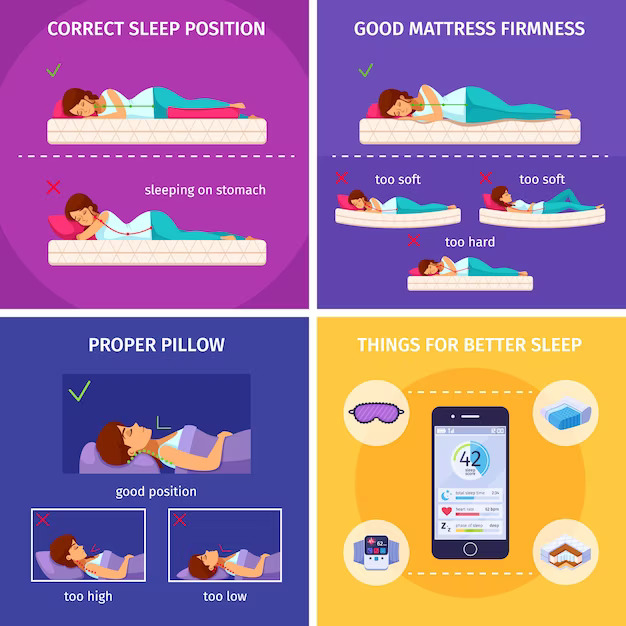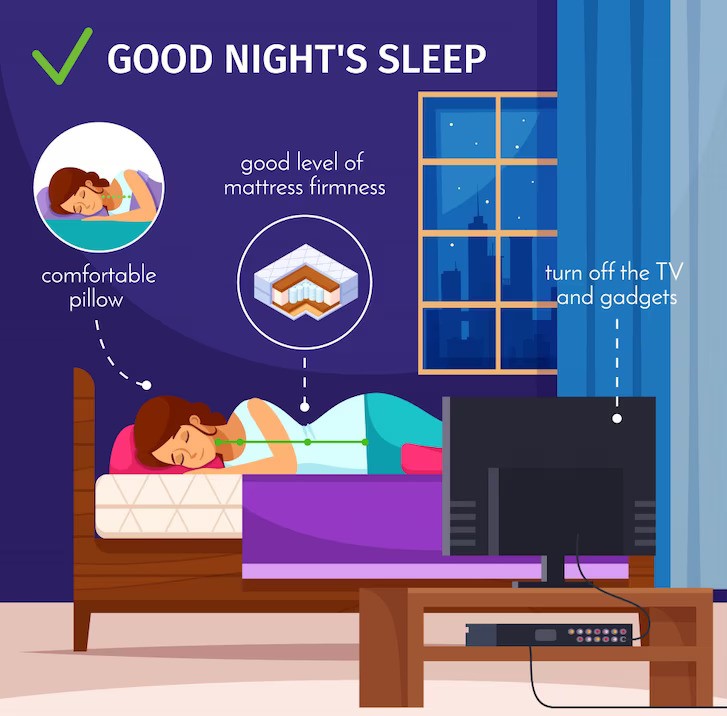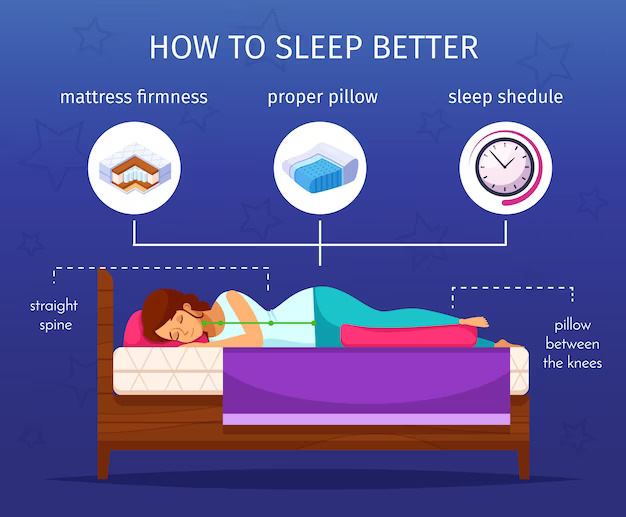

Coirfit
20+ Tips On How to Sleep Well
- ,
- , Sleep Tips, Uncategorized
Getting a good night’s sleep can sometimes feel like an elusive dream but it is crucial for our overall well-being. Lack of sleep can lead to a range of health problems, from mood swings to serious issues like high blood pressure and obesity. Many of us even struggle with sleep problems that leave us feeling groggy and fatigued. If you find yourself tossing and turning at night, fret not! In this article, we will be unveiling 20 valuable tips that will help you sleepwell, night after night. So, without further ado, let’s explore these tips and bid farewell to those sleepless nights!

Physical Preparation To Sleep Well
1. Establish a Consistent Schedule
Set a regular bedtime and wake-up time, even on weekends. Follow the same routine each night before you nap, signaling your body that it’s time to wind down.
2. Create a Serene Nap Environment
Keep your bedroom cool, dark, and quiet. Invest in comfortable bedding and a supportive mattress that helps regulate the right temperature. This will encourage your body to produce melanin, a hormone that regulates sleep.
3. Optimize Your Bedroom Lighting
Dim the lights in your bedroom as bedtime approaches. Consider using blackout curtains or an eye mask to block out any unwanted light.
4. Limit Daytime Napping
Avoid daytime naps if possible as they may interfere with your ability to sleep at night. If you need to nap, limit it to a maximum of 15-20 minutes and avoid napping late in the day.
5. Establish a Relaxing Bedtime Ritual
Engage in calming activities, such as reading a book or taking a warm bath before bed. Avoid stimulating activities, like intense exercise or consuming caffeine, in the evening.
6. Avoid Screen time before bedtime
Remove electronic devices from your nap space. Blue light emitted by electronic devices can interfere with your circadian rhythm, making it harder to fall asleep and reducing the quality of the nap you get.

Mental Preparation To Nap Well
7. Practice Mindfulness and Relaxation Techniques
Try incorporating relaxation techniques, such as deep breathing exercises or meditation, into your bedtime routine. Mindfulness can help calm your mind and prepare it for a restful sleep.
8. Manage Your Worries and Thoughts
Write down your worries or thoughts before bed to help clear your mind. If you find yourself repeatedly ruminating, try scheduling “worry time” earlier in the day.
9. Avoid working in bed
Remind yourself to use your bed only for sleeping, as working or watching TV in bed can make your mind associate your bed with these activities, making it harder to fall asleep.
10. Set aside time to wind down before bed
Give your mind time to relax before bed by avoiding stimulating activities and screens at least an hour before bedtime.
Diet and Exercise To Sleep Well
11. Exercise Regularly
Engage in moderate exercise during the day, as it can promote better sleep. Avoid vigorous exercise too close to bedtime, as it may lead to increased alertness and interferes with your ability to fall asleep.
12. Avoid Heavy Meals Before Bedtime
Refrain from consuming heavy meals or spicy foods close to bedtime. Opt for light snacks, such as a small amount of protein, warm glass of milk or lavender tea.
13. Say No to Late-Night Caffeine and Alcohol
Avoid consuming stimulants, such as caffeine and nicotine, close to bedtime. Although alcohol may make you feel drowsy initially, it can disrupt your nap patterns later. It impacts the REM sleep stage causing you to wake up frequently throughout the night.

14. Limit Liquids Before Bed
Minimize your fluid intake before bedtime to reduce the frequency of nighttime trips to the bathroom. However, ensure you stay hydrated throughout the day to support overall well-being.
15. Create a Comfortable Environment
Use earplugs, a white noise machine, or soothing music to block out disruptive noises. It also promotes relaxation so you can nap well without any worries. Ensure your pillows and mattress provide proper support to avoid any discomfort.
Quick Tips to Sleep Well
16. Pay Attention to Your Mattress and Pillows
Assess the quality of your mattress and pillows. If needed, invest in ones that suit your specific comfort needs. Replace your mattress and pillows every 7-10 years for optimal support and hygiene.
17. Use aromatherapy
Essential oils like lavender or chamomile can help you relax and promote better sleep quality.
18. Wear comfortable clothing to bed
Choose breathable clothing that doesn’t restrict your movement during sleep.
19. Experiment with Different Positions
Find a sleep position that provides optimal comfort and supports spinal alignment. Pillows strategically placed between your knees or under your neck can help alleviate discomfort.
20. Explore Herbal Remedies for Better Sleep
Consider incorporating natural sleep aids, like chamomile tea or lavender essential oils, into your nighttime routine. Always consult with a healthcare professional before trying any new remedies or supplements.
21. Maintain a Comfortable Room Temperature
Keep your bedroom cool, ideally between 60-67 degrees Fahrenheit (15-19 degrees Celsius). Adjust your bedding and clothing to ensure you’re neither too hot nor too cold.22.
22.Evaluate Your Medications and Supplements
Check if any of your current medications or supplements may be impacting your sleep quality. Discuss potential alternatives or adjustments with your healthcare provider.

23. Seek Professional Help if Needed
If you constantly struggle with sleep problems, it may be beneficial to consult a sleep specialist. They can help identify underlying issues and provide personalized solutions to improve your sleep quality.
Sleep is a vital aspect of overall health and well-being. By implementing even a few of these 23 tips into your routine, you’ll be well on your way to achieve the restful and rejuvenating sleep you deserve. Remember, quality sleep is not an indulgence but a vital component of a healthy lifestyle. So, prioritize your nap, and bid adieu to those sleepless nights and sleep well.
To purchase a comfortable mattress, visit www.coirfitmattress.com/mattresses.
know more about Coirfit Updates and Sleep Tips, Binge on-

To know more about Coirfit Updates and Sleep Tips, Binge on-
















